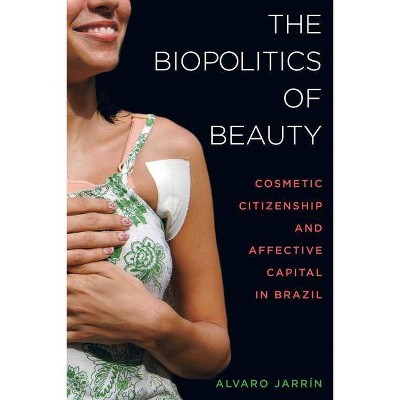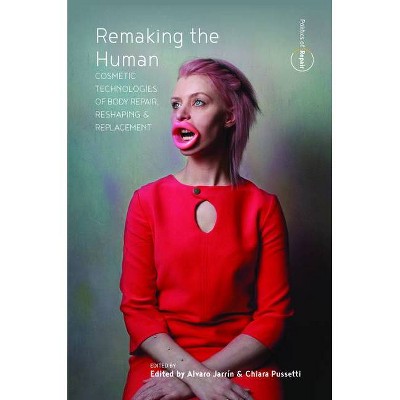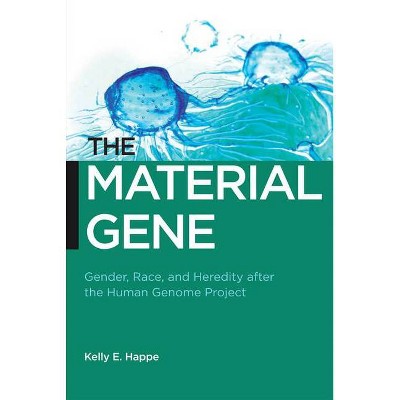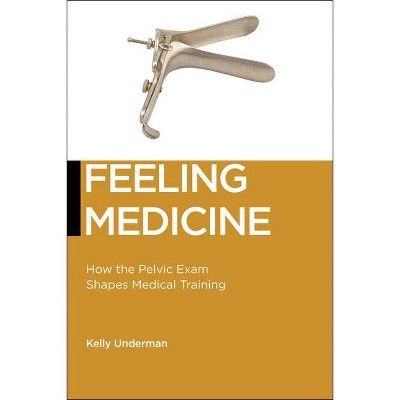The Biopolitics of Beauty - by Alvaro Jarrín (Paperback)

Similar Products
Products of same category from the store
AllProduct info
<p/><br></br><p><b> About the Book </b></p></br></br>"The Biopolitics of Beauty examines how beauty became an aim of national health in Brazil. Based on ethnographic fieldwork carried out in Brazilian hospitals, the author explains how plastic surgeons and patients navigate the public health system to transform beauty into a basic health right. The book historically traces the national concern with beauty to Brazilian eugenics, which established beauty as an index of the nation's racial improvement. From here, Jarrâin explains how plastic surgeons became the main proponents of a raciology of beauty, using it to gain the backing of the Brazilian state. Beauty can be understood as an immaterial form of value that Jarrâin calls "affective capital," which maps onto and intensifies the social hierarchies of Brazilian society. Patients experience beauty as central to national belonging and to gendered aspirations of upward mobility, and they become entangled in biopolitical rationalities that complicate their ability to consent to the risks of surgery. The Biopolitics of Beauty not only examines the biopolical regime that made beauty a desirable national project, but also the subtle ways in which beauty is laden with affective value within everyday social practices, thus becoming the terrain upon which race, class, and gender hierarchies are reproduced and contested in Brazil."--Provided by publisher.<p/><br></br><p><b> Book Synopsis </b></p></br></br><i>The Biopolitics of Beauty</i> examines how beauty became an aim of national health in Brazil. Using ethnographic fieldwork carried out in Brazilian hospitals, the author shows how plastic surgeons and patients navigate the public health system to transform beauty into a basic health right. The book historically traces the national concern with beauty to Brazilian eugenics, which established beauty as an index of the nation's racial improvement. From here, Jarrín explains how plastic surgeons became the main proponents of a raciology of beauty, using it to gain the backing of the Brazilian state. Beauty can be understood as an immaterial form of value that Jarrín calls "affective capital," which maps onto and intensifies the social hierarchies of Brazilian society. Patients experience beauty as central to national belonging and to gendered aspirations of upward mobility, and they become entangled in biopolitical rationalities that complicate their ability to consent to the risks of surgery. <i>The Biopolitics of Beauty</i> explores not only the biopolitical regime that made beauty a desirable national project, but also the subtle ways in which beauty is laden with affective value within everyday social practices--thus becoming the terrain upon which race, class, and gender hierarchies are reproduced and contested in Brazil.<p/><br></br><p><b> From the Back Cover </b></p></br></br>"What lies at the heart of the yearning for beauty? In this sophisticated but accessible ethnography about plastic surgery in Brazil, Alvaro Jarrín unpacks the historical entanglement of beauty, race, and gender. In a voice both critical and poignant, Jarrín offers a prescient platform from which to consider the ethical, cultural, and political underpinnings of the approaching global boom in cosmetic procedures."--Robin Sheriff, author of <i>Dreaming Equality: Color, Race, and Racism in Urban Brazil</i> <p/> "At once timely and sharp-edged, <i>The Biopolitics of Beauty</i> examines the affective labor wrought by plastic surgeons and everyday Brazilians to render their bodies 'beautiful' in regimes that privilege, and racialize, class. Combining biopolitics with affect, and critiquing a governmentality that fosters a 'cosmetic citizenship' that does nothing to undo the precarity of those (classed/raced) at the bottom despite the 'gift' of free surgery, Jarrín is masterful in a book as ethnographically as theoretically rich."--Anne Allison, Professor of Cultural Anthropology at Duke University and author of <i>Precarious Japan</i><p/><br></br><p><b> Review Quotes </b></p></br></br><br>"<i>The Biopolitics of Beauty</i> is gripping in its empirical narrative and in its theoretical framework, which demonstrates that empirical attention to beauty can bring together theories about medicalization and theories about affect. . . . Jarrín demonstrates that affect and biopolitical discourse shape how patients and plastic surgeons engage each other around questions of beauty, health, and social mobility."-- "PoLAR: Political and Legal Anthropology Review"<br><p/><br></br><p><b> About the Author </b></p></br></br><b>Alvaro Jarrín</b> is Assistant Professor of Anthropology at College of the Holy Cross.
Price History
Cheapest price in the interval: 34.99 on October 27, 2021
Most expensive price in the interval: 34.99 on December 20, 2021
Price Archive shows prices from various stores, lets you see history and find the cheapest. There is no actual sale on the website. For all support, inquiry and suggestion messages communication@pricearchive.us




















